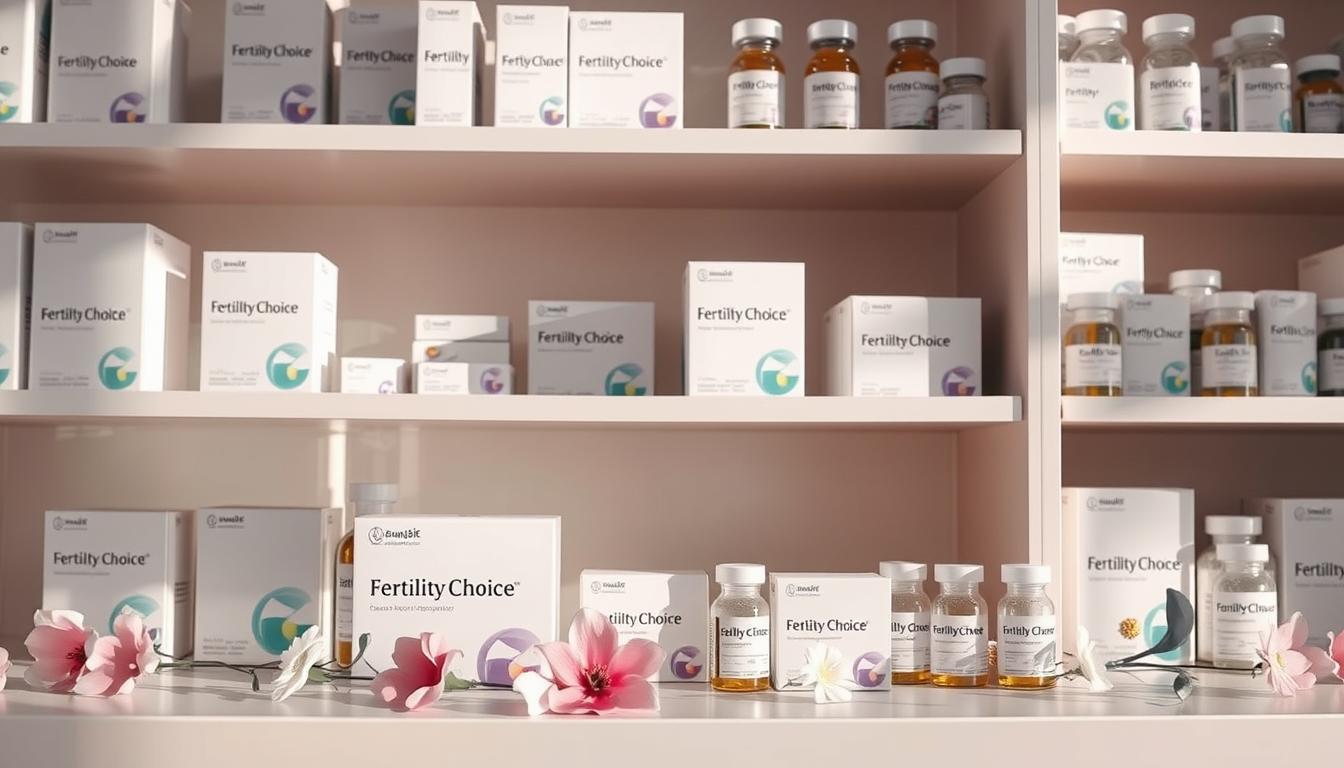
Infertility is a big problem for many couples. About 15% of all couples in the United States and over 180 million worldwide are trying to conceive1. It’s important to know the best fertility drugs to get pregnant. These drugs can really help improve your chances of success.
Fertility drugs are a common treatment for those struggling with infertility. Knowing about the different types, including prescription and over-the-counter options, helps you make better choices.
Finding the right fertility pills for pregnancy can be tough. But with the right help, you can boost your chances of getting pregnant. About 50% of young, healthy couples in the U.S. who don’t conceive in their first year will succeed in the next 12 months without treatment1. Also, sperm takes about 10 weeks to produce2. Some medicines, like nitrofurantoin, can harm sperm counts and motility2.
Fertility drugs are a key part of effective fertility treatments. They help individuals or couples conceive. These medicines stimulate ovulation, improve egg quality, or boost sperm production. This increases the chances of getting pregnant.
About 10-15% of couples face infertility, affecting around 6.1 million women in the U.S3.
There are many fertility-boosting medications, like Clomiphene citrate and gonadotropins. They work by releasing hormones that trigger ovulation or improve sperm quality. The main aim is to produce one mature egg per cycle4.
Increasing FSH and LH levels is also crucial for ovulation5.
Before starting fertility treatment, it’s vital to talk to a healthcare professional. They will guide you to the best treatment and medication. This way, many people can overcome infertility and start a family3.
Fertility drugs are key for those trying to conceive. The right drug depends on the person’s health and history. There are many types, including prescription meds and supplements you can buy over the counter.
Prescription drugs like clomiphene and gonadotropins are often used to help with infertility6. They help women ovulate and improve fertility in men. Clomiphene Citrate (Clomid) works well, helping 70-90% of users7. About 50% of women get pregnant within six cycles7.
Over-the-counter supplements can also boost fertility. They usually have natural ingredients that help reproductive health. Always talk to a doctor before taking these supplements to make sure they’re safe and work well.
| Type of Fertility Drug | Description |
|---|---|
| Clomiphene | Stimulates ovulation in women |
| Gonadotropins | Improves fertility in men and women |
| Fertility Supplements | Supports reproductive health |
Choosing the right fertility drug is key. You should think about your age, medical history, and lifestyle. Popular fertility supplements for women can be a good start. But, it’s vital to talk to a healthcare professional to find the best treatment for you. About 25% of women face fertility challenges due to ovulation issues8. Fertility drugs for ovulation stimulation can help a lot.
A healthcare professional will guide you in picking the right fertility drug. They’ll look at your age, medical history, and lifestyle. For instance, Clomid (clomiphene citrate) is often used. It helps about 30% of women get pregnant within three months8.
Other popular fertility supplements for women include Femara (letrozole) and hormone shots (gonadotropins). Femara works better for women with PCOS, with about 27.5% getting pregnant in five cycles8. Always talk about the risks and side effects with your healthcare professional. This way, you can make a well-informed choice.
When looking into the best fertility drugs, knowing the risks and side effects is key. Fertility drugs can cause a variety of side effects, from mild to severe9. These can include mood swings, nausea, vomiting, headaches, and breast tenderness9.
Some drugs, like clomiphene citrate, have been used for over 40 years. They have a success rate of about 50% for ovulation10. But, they can also raise the chance of having twins or ovarian hyperstimulation syndrome10. Always talk to a healthcare professional about these risks and side effects.
Here are some common side effects of fertility drugs:
Telling a healthcare professional about any side effects is important9.
In rare cases, fertility drugs can cause severe side effects. Ovarian hyperstimulation syndrome is one, leading to nausea, rapid weight gain, and dehydration10. It’s vital to know these risks and follow a healthcare professional’s advice when using these drugs.
| Side Effect | Description |
|---|---|
| Mood swings | Changes in mood, including anxiety and depression |
| Nausea and vomiting | Stomach upset, including nausea and vomiting |
| Headaches | Pain or discomfort in the head or neck |
Success in fertility treatments depends on many things, like age and health history11. But, with the right treatment, many people have found success. Medications like Clomid and Femara help by making ovulation happen and leading to pregnancy11.
Other treatments, like injectable gonadotropins, mimic natural hormones used in IVF11. IVF is about three times more likely to lead to pregnancy than IUI12. While IVF’s success is higher than just medication, exact success rates for meds are not given12.
Several things affect how well fertility treatments work:
It’s important to have realistic hopes and to talk to a healthcare expert. They can help find the best treatment. With the right help, many people have built their families successfully.
Fertility drugs for women help with ovulation, egg quality, or fertility. They can be prescribed by a doctor and include fertility drugs for ovulation stimulation or over-the-counter fertility medications. About 25% of women face ovulation issues, and 80% of healthy women can ovulate with Clomid if they don’t already8.
There are many types of fertility drugs for women, like oral and injectable ones. Oral drugs, like Clomiphene citrate (Clomid) and Letrozole (Femara), are used for ovulation problems, including PCOS13. These drugs boost hormone levels to help eggs mature or lower estrogen to stimulate egg production13.
Examples of fertility drugs for women include:
It’s important to talk to a doctor before starting fertility treatment. They can guide you on the best treatment and how to use drugs safely8. The cost of these drugs varies, with Clomid around $100 and Femara about $120 per month8.

Following the dosage instructions and knowing about side effects like hot flashes and headaches is key13. Working with a healthcare professional and using drugs as directed can boost your chances of getting pregnant8.
| Fertility Drug | Success Rate | Cost |
|---|---|---|
| Clomid | 30% within three months of treatment8 | $100 per month8 |
| Femara | 27.5% for achieving pregnancy within five cycles8 | $120 per month8 |
Fertility medications can help men with infertility issues. About 2 percent of men with infertility have a treatable condition called secondary hypogonadism14. These drugs can improve sperm count to nearly 15 million per milliliter of semen14.
Clomiphene is a top fertility pill that can improve sperm quality and fertility. Men take one pill three times a week for three to six months. If hormone levels stay normal, treatment can last up to two years14. Gonadotropins, like human chorionic gonadotropin (hCG), also boost testosterone and sperm production15.
Fertility drugs for men have different success rates and side effects. IVF with Intracytoplasmic Sperm Injection (ICSI) can greatly increase fertilization chances, even with low sperm count16. Men with low sperm count have less than 5% chance of conceiving naturally16.
It’s important to follow the treatment plan and dosage of fertility medications. Clomiphene costs between $10 to $100 per month, and hCG is about $180 per month14. Always talk to a healthcare professional before starting treatment to discuss the best options and risks.
| Fertility Drug | Success Rate | Cost |
|---|---|---|
| Clomiphene | Up to 90%14 | $10-$100 per month14 |
| hCG | Up to 90%14 | $180 per month14 |
Many people look to fertility supplements and drugs to help conceive. But, natural ways can also boost fertility. Eating well, exercising, and managing stress are key for health and fertility17.
Changing your lifestyle can improve your fertility. Eating more fiber and less sugar can help, with 25 grams of fiber daily recommended17. Omega-3s and antioxidants in supplements can also support fertility18.
Some research shows prenatal vitamins can boost fertility. They can lead to more pregnancies and quicker conception18. Supplements like vitamin B6 and myoinositol can also help with hormones and ovulation18. Always talk to a doctor before starting new supplements or making big lifestyle changes.
In summary, natural methods like diet and supplements can help with fertility. Adding these to your fertility plan can increase your chances of getting pregnant1718.
When looking for the best fertility drugs, it’s key to know what’s out there. Fertility medications can help those facing infertility challenges19. The right drug depends on your age, health, fertility issues, and how much you can spend20.
How well fertility treatments work varies by person and treatment type20. For example, women over 40 have a 13.7% chance of success with IVF per cycle21. It’s important to keep up with ultrasounds and blood tests for egg growth and timing20.
In short, drugs like clomiphene citrate and letrozole help with ovulation19. Always talk to a doctor to find the best treatment. With the right drugs and support, many can get pregnant and start a family.

Knowing your options and the pros and cons of fertility drugs is crucial. Remember, hope and determination are vital in the fight against infertility. With the right help, many can achieve their dream of becoming parents.
Starting your journey to have a baby? The first thing to do is see a healthcare professional22. They will help you understand your situation and find the best treatments9. Everyone’s fertility issues are different, so a tailored approach is key.
After meeting with a healthcare provider, they will help you with tests and assessments22. You might have scans, blood tests, and more to check your reproductive health23. This way, they can create a treatment plan just for you, boosting your chances of getting pregnant.
Starting a family can be complex, but with the right help, you can feel confident9. By reaching out to a fertility specialist, you’re taking a big step towards your dream of becoming a parent22. Let the experts lead you towards a fulfilling journey.
Stay Connected and Get Personalized Assistance
Thank you for reading! We hope you found this post helpful and informative. If you have any questions or need further assistance, please reach out. We’re here to help you on your journey
